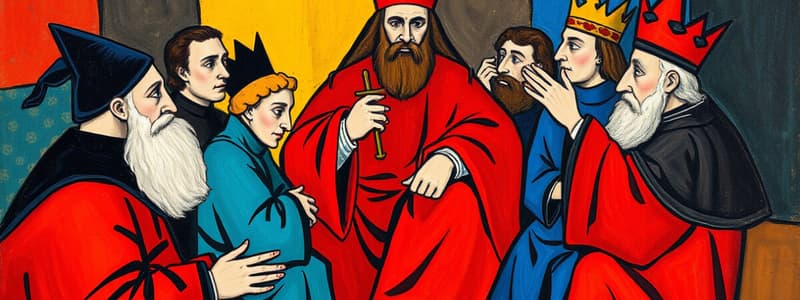Podcast
Questions and Answers
Which of the following are impacts of the Protestant Reformation? (Select all that apply)
Which of the following are impacts of the Protestant Reformation? (Select all that apply)
What was the purpose of the Council of Trent?
What was the purpose of the Council of Trent?
To set the agenda for revitalizing the Catholic faith.
What does the domestication of reform emphasize?
What does the domestication of reform emphasize?
The family is the center of human life.
Modern ideals challenged traditional authority.
Modern ideals challenged traditional authority.
Signup and view all the answers
What was a main outcome of the Peasants' Revolt?
What was a main outcome of the Peasants' Revolt?
Signup and view all the answers
What was the significance of the Peasants' Revolt?
What was the significance of the Peasants' Revolt?
Signup and view all the answers
The results of the Peasants' Revolt included around ______ peasant deaths.
The results of the Peasants' Revolt included around ______ peasant deaths.
Signup and view all the answers
Study Notes
Impact of the Protestant Reformation
- Shattered religious unity across Europe, leading to fragmented Christian denominations.
- Triggered an era of religious conflict, including the Thirty Years' War, which devastated large parts of Europe.
- Shifted authority from ecclesiastical leaders to political figures, altering the power dynamics of governance.
- Spurred the Catholic Reformation, prompting internal reforms and a response to Protestant critiques.
- Introduced social changes and new ideas, creating a cultural shift during the early modern period.
- Laid foundations for modern ideals, including individual empowerment and secular governance movements.
The Council of Trent
- A series of meetings convened to revitalize the Catholic Church, outlining reforms and responses to Protestantism.
- Reaffirmed key Catholic doctrines in the face of Protestant challenges, solidifying the faith's core beliefs.
- Implemented clerical reforms aimed at ending corruption within the clergy and enhancing moral integrity.
- Established a system of censorship to regulate and restrict access to literature deemed dangerous or heretical.
The Domestication of Reform
- Positioned the family as the central unit of human life, emphasizing its importance over religious monasticism.
- Promoted the notion that familial roles and responsibilities were more virtuous than pursuing a life as a monk or nun.
Modern Implications
- Challenged traditional authorities, encouraging questioning of established power dynamics.
- Fostered an ethic of individualism, empowering people and promoting personal agency.
- Contributed to the early seeds of democratic principles, including individual rights and social equality.
The Peasants' Revolt
- A significant uprising by peasants in central and southern Germany, inspired by Martin Luther's ideas on spiritual equality.
- Sought social justice through claims for customary rights, challenging oppressive feudal systems.
- Demanded liberation from excessive taxation and maltreatment by nobility and landlords.
Results of the Peasants' Revolt
- Peasants formed organized armies and engaged in violent reprisals, targeting castles and monasteries.
- An estimated 100,000 peasants lost their lives during the conflict due to repression and violence.
- Luther's response included the publication "Against the Murdering Thieving Hordes of Peasants," condemning the revolt.
Significance of the Peasants' Revolt
- The Reformation generated new ideas about equality and rights but failed to instigate a social revolution.
- Reinforced the existing social hierarchy in the short term, demonstrating the limitations of reformations in achieving widespread social change.
Studying That Suits You
Use AI to generate personalized quizzes and flashcards to suit your learning preferences.
Description
Test your knowledge on the effects of the Protestant Reformation with this quiz. Explore how it shattered religious unity, led to warfare, and influenced power dynamics in Europe. Learn about the Council of Trent and its significance in the Catholic Reformation.




